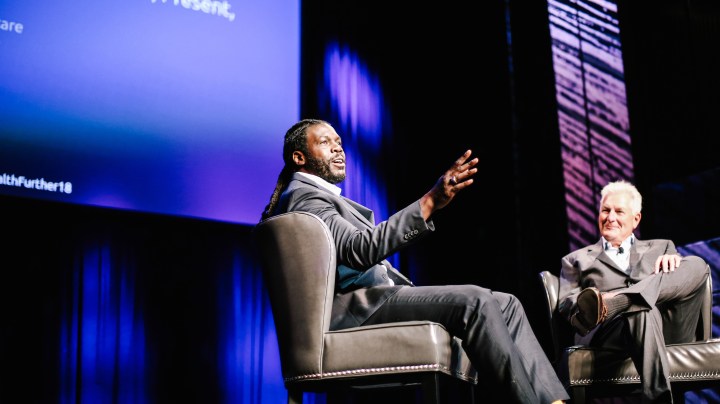
Nashville VC fund invests in health startups led by Black entrepreneurs
Nashville VC fund invests in health startups led by Black entrepreneurs

Marcus Whitney stands out in Nashville’s huge health care sector as an investor in startups. In addition to his venture capital firm, he’s organized an annual health tech conference and co-founded the city’s pro soccer club.
And often, he’s the only Black man in the room.
So in the summer of 2020, as Black Lives Matter protestors filled the streets in Nashville and around the country following George Floyd’s murder, Whitney thought about the racial inequalities he saw in his industry.
“I sat at the intersection of two communities — one that I was born into and one that I had matriculated into,” he said.
On a quiet Sunday morning after protests died down, he pounded out a long letter to his peers that pointed out those making the most money from Nashville’s health care industry are still almost all white men.
Whitney hit publish on Monday morning, and the open letter led to weeks of intense conversations.
Long-standing racial disparities in health care
The racial reckoning of the last couple of years has inspired different industries to take a look at their histories and practices. In health care, there are longstanding and well-documented disparities between care for Black and white patients.
Those disparities have carried over into who gets funding for research and health startups. Of the more than 900,000 health care and social assistance firms in the United States, roughly 35,000 — or less than 4% — are Black-owned.
While Whitney wrote that this problem isn’t his to fix, he realized he’s in a unique position as one of the few Black venture capitalists in health care. So his firm launched a dedicated fund to get behind Black entrepreneurs in health care.
“The impact, I think, that the letter had, the response that the letter had, were pretty key to convening the conversation from which the fund emerged,” he said.
Jumpstart Nova VC fund
The fund is called Jumpstart Nova. It raised $55 million from the likes of pharmaceutical giant Eli Lilly, medical supplier Cardinal Health and the hospital chain that started Nashville’s health care industry, HCA.
Whitney said he didn’t have to convince those firms that investing in Black founders was a wise move, but he did have to make the case that there were enough promising startups to choose from.
“That was really emblematic of the fact that there was a disconnect between the communities. These investors simply did not know enough Black people to know whether or not there were enough deals out there,” Whitney said. “This is not like an indictment of them. This is the reality of our country.”
Jumpstart Nova has found itself as the lead investor in three of the four companies it’s working with so far. That means Whitney’s team scrutinizes the business plan, vouches for the founder and draws up all the documents so it’s easier for others to come along.
“It’s validation. You need someone to say, ‘We’re in,’” said Dr. Derrell Porter, founder of San Francisco-based Cellevolve Bio.
Bringing cell therapies to market
Porter’s startup is one of the first to land a lead investment from Jumpstart Nova. The firm is trying to streamline the process of commercializing promising cell therapies that treat cancer so that it’s similar to the way a pharmaceutical company takes drugs to market.
“Marcus was one of the few investors that I spoke to that immediately got what we’re talking about,” Porter said. “He was like, ‘This is either not going to work at all, or it’s going to be massive. It’s nowhere in between.’”
Jumpstart is primarily looking for untapped profit potential with Black-led companies. But the venture fund’s backers also say they expect some startups will work on fixing health inequities.
One of its initial investments is in DrugViu, which consolidates the medical records of autoimmune disease patients — particularly underrepresented people of color — so they can more easily include their personal health data in scientific research.
Algorithms, AI and Black representation
Dr. James Hildreth, president of Nashville’s Meharry Medical College, said he hopes some startups will work to ensure health inequities don’t get worse, especially now that so many new companies in health care are built around using artificial intelligence. Hildreth said he fears what big data could do without Black representation.
“The people designing the algorithms can unconsciously sometimes put their own biases into how the algorithms are designed and how they function,” he said.
The historically Black Meharry Medical College has decided to invest in the Jumpstart Nova fund. Meharry said he sees it as an opportunity to make money aligned with the school’s mission — and to make a statement to students.
“We believe enough in the ingenuity, the innovation and the intelligence of folks who look like us that we’re willing to invest in them, with the expectation that the companies that come out of this fund are going to have a huge impact, not just on our communities, but people in general,” Hildreth said.
There’s a lot happening in the world. Through it all, Marketplace is here for you.
You rely on Marketplace to break down the world’s events and tell you how it affects you in a fact-based, approachable way. We rely on your financial support to keep making that possible.
Your donation today powers the independent journalism that you rely on. For just $5/month, you can help sustain Marketplace so we can keep reporting on the things that matter to you.











